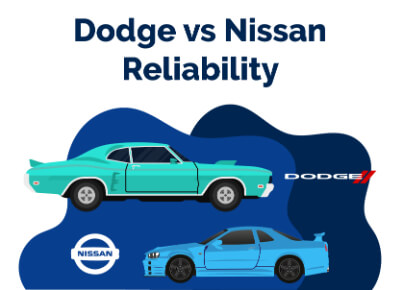Dodge vs Nissan: Which Is More Reliable?
July 11, 2023


Chris is Head of Content for FindTheBestCarPrice and is based out of Philadelphia, PA. As a seasoned automotive industry analyst and car enthusiast, he ensures the highest level of quality across all our content and curates our picks for the best deals each month.
Chris studied information systems and marketing at Drexel University and writes about a wide range of topics ranging from car buying tips to troubleshooting common mechanical issues.
When he’s not thinking about cars, he likes to stay in with his dog and make an “attempt” to finish a crossword puzzle (he’s not quite at the Saturday/Sunday level…yet). As a former cheesemonger, Chris still has a “sharp” passion for all things cheese, and his fridge is always loaded with it!
Chris also has a passion for things that go fast, and drones are no exception. He spends some of his time writing for Dronesourced.
When it comes to the reliability of automobiles, Dodge and Nissan are two brands that have gained considerable attention. Both companies have established a strong reputation for producing vehicles that can endure the test of time. Their devoted customer bases stand as a testament to this fact.
Even concerning comparing Dodge and Nissan's reliability, myriad factors exist. These encompass the engineering and design of the vehicles, the caliber of materials employed in manufacturing, and additional variables that can affect the overall dependability of a car.
This article will delve into Dodge vs. Nissan's reliability and scrutinize the various parameters contributing to their respective market reputations.
By analyzing data and seeking customer feedback, our objective is to provide a comprehensive and meticulous assessment of the reliability of these two esteemed automotive brands.
Table of Contents
Dodge vs. Nissan Reliability: Detailed Comparison
| Features | Dodge | Nissan |
| Design | ||
| Repairs and Maintenance Cost | ||
| Durability | ||
| Engine | ||
| Gas Mileage | ||
| Technology | ||
| Safety |
Which Is the Best Car: Dodge or Nissan?
Dodge has established a reputation for fabricating high-performance vehicles that deliver an unparalleled adrenaline rush.
With an array of models tailored to suit diverse driver preferences and lifestyles, the brand has become synonymous with athletic aesthetics and potent engines that pack a wallop.
Conversely, specific consumers have expressed skepticism concerning the durability and fuel efficiency of Dodge vehicles, raising apprehensions about their long-term value.
In contrast, Nissan has garnered recognition for crafting pragmatic and dependable vehicles that cater to a broad spectrum of drivers.
Nissan cars are renowned for their reliability, with numerous models consistently achieving high ratings on industry reliability metrics. The automaker's roster spans from efficient urban cars to rugged SUVs, proffering choices for families, explorers, and individuals.
Nissan also prides itself on pioneering technologies, such as the ProPILOT Assist system, which amplifies driver assistance and safety.
Dodge vs. Nissan Reliability: Design
The Dodge brand epitomizes its muscle car heritage through its striking design, featuring bold contours that encapsulate the essence of its name.
The LED halo headlights are designed to emulate the iconic headlights of the 1971 Challenger, incorporating contemporary elements, such as a lengthy hood, a truncated rear, and a divided grille.
Meanwhile, Nissan embodies a unique perspective, deriving from its Japanese origins, with a reverence for nature, significance, and consideration for the impact on others.
Nissan has adapted this Japanese DNA to the changing times through their Nissan Design J-DNA, which embodies a more universal and global perspective. Their approach leads to a better society and a more fulfilling life through cars.
Winner: Both
Dodge vs. Nissan Reliability: Repair and Maintenance Cost
According to industry data, the average maintenance and repair expenses for Dodge models during their initial decade of service are around $11,079, exceeding the popular brand industry average by $4,265.
Moreover, there is a 26.04% likelihood that a Dodge will necessitate a significant repair during that period.
On the other hand, Nissan's models have an average maintenance and repair cost of $8,088 throughout their first ten years of service.
While this amount is lower than Dodge's cost, it still surpasses the industry average by $1,274, which may pose a considerable burden for buyers on a tight budget.
Ultimately, while Nissan's reliability may translate to fewer repairs and expenses, buyers must consider the associated costs when purchasing.
Winner: Nissan
Dodge vs. Nissan Reliability: Durability
Dodge vehicles have high-quality components and robust powertrains, rendering them durable and dependable options, even with over 100,000 miles on the odometer.
With a century of experience, Dodge is renowned for manufacturing vehicles that endure the test of time.
Dodge has garnered a relatively strong reputation on the reliability front, receiving a 3.5 out of 5 reliability rating from RepairPal.com.
In comparison, Nissan has earned a commendable reliability rating of 4.0 out of 5.0, placing the automaker in a decent ninth place out of 32 manufacturers, according to RepairPal.
This rating is based on evaluating the dependability of 245 distinct car models. Despite this, Nissan still surpasses several other car brands, such as Subaru and Buick, in terms of durability.
Winner: Nissan
Dodge vs. Nissan Reliability: Engine
Dodge has established a renowned reputation for producing engines that are not only dominant but also resilient and widely adopted for muscle car customization.
Many of the world's most distinguished muscle cars are either Dodges or are outfitted with Dodge engines, particularly the V8 Hemi models.
The 2022 Dodge Challenger is the quintessential example. Its Supercharged 6.2L High-Output HEMI® V8 engine makes it the most potent muscle car and the production car with the highest horsepower. In terms of muscle cars, Dodge's engines are undisputedly the powerhouse.
Meanwhile, Nissan offers drivers various options to cater to diverse driving needs.
One of the options is a 1.6L 4-cylinder engine that can deliver up to 180hp, and another is a 2.5L 4-cylinder engine that generates 188hp. And for those who seek even more power, the 3.0L V6 engine produces almost 300hp.
For environmentally-conscious drivers, Nissan's LEAF is an exceptional choice. With its electric powertrain consisting of a forty-kWh battery pack and 110 kW electric motor, the vehicle boasts an impressive range of up to 111 miles.
While Dodge leads the way in the muscle car category, Nissan's range of options, including its eco-friendly LEAF, makes it the winner in versatility.
Winner: Nissan
Dodge vs. Nissan Reliability: Gas Mileage
The 2022 Dodge Charger and Durango GT boast impressive fuel efficiency, offering 19 mpg in the city and 30 mpg on the highway.
The AWD versions of the Charger and Challenger deliver a slightly lower 18 mpg in the city and 27 mpg on the highway. In comparison, the R/T trims provide 16 and 25 mpg in the city and on the highway, respectively.
However, the SRT and Hellcat versions of both the Challenger and Charger have lower fuel efficiency. The Challenger SRT Hellcat is the least efficient, offering only 13 mpg in the city and 22 mpg on the highway.
On the other hand, Nissan offers an electric option with the Leaf, earning an impressive 111 MPGe. Among its gasoline models, the Nissan Versa leads the pack with 35 mpg, followed by the Nissan Kicks and Sentra at 33 mpg.
The Nissan Altima and Rogue score 32 and 30 mpg, respectively, while the Nissan Maxima and Murano drop to 24 and 23 mpg. The Nissan 370Z, TITAN, and Armada complete Nissan's lineup with 20, 18, and 16 mpg, respectively.
Overall, Nissan has a better fuel economy across its lineup, with the Leaf standing out as a top performer in terms of efficiency.
Dodge's performance vehicles may have lower fuel efficiency due to their powerful engines and high-performance capabilities.
Winner: Nissan
Dodge vs. Nissan Reliability: Technology
The Dodge Challenger's Uconnect Access System offers extensive features through an 8.4-inch high-resolution touchscreen display. 3D navigation, real-time traffic information, and SiriusXM Travel Link provide all the necessary information for a smooth ride.
Voice Text Reply and hands-free calling keep you connected while driving. App integration and mobile Wi-Fi hotspot capabilities keep you connected to your digital world.
The 7-inch reconfigurable cluster display provides valuable information about your Challenger's performance, including lap times, g-force, and fuel economy.
Nissan offers an advanced voice control system with natural language-understanding technology, significantly improving the usability of conventional voice interfaces.
It uses advanced voice recognition technology to estimate the user's intention from vague utterances. It controls in-vehicle equipment, allowing for quick and accurate operation while driving.
Saying "Hello Nissan" will activate Voice Control. Using natural language, the user will be able to control in-vehicle equipment, such as navigation, audio, air-conditioning systems, and telephone.
The smartphone app lets you perform operations such as locking the vehicle doors, turning the air conditioner on/off, and checking the status of your vehicle, such as the remaining battery or the warning lights.
The interface's simple design lets you understand the necessary information at a glance, making it easy to connect to your vehicle anytime, anywhere.
In terms of features, both Dodge and Nissan offer impressive technology. However, Dodge's Uconnect Access System offers more features, including 3D navigation, real-time traffic information, and mobile Wi-Fi hotspot capabilities.
Dodge also provides valuable information about the Challenger's performance through the 7-inch reconfigurable cluster display.
Nissan's voice control system with natural language-understanding technology is impressive, making it easy to control in-vehicle equipment using natural language. However, it needs more extensive features that Dodge offers through its Uconnect Access System.
Winner: Dodge
Dodge vs. Nissan Reliability: Safety
Dodge offers a range of advanced features that enhance the driving experience and safety.
The car has Rain-Sensing Windshield Wipers, automatic high beams, a Blind Spot Monitoring system, ParkView Rear Back-Up Camera, Adaptive Cruise Control, and Forward Collision Warning.
These features ensure that Dodge is a reliable and efficient car that offers peace of mind to drivers.
Meanwhile, Nissan believes that in the future era of automated driving, driver-assistance technology that can avoid highly complex accidents will be essential to ensure customer peace of mind.
Nissan has developed an advanced driver-assistance technology called ProPILOT that dramatically enhances collision-avoidance performance with the ground truth perception technology.
ProPILOT assists with acceleration, braking, and steering operations when driving on a single lane on a highway.
The driver sets the vehicle speed, but the system supports vehicle speed changes when the speed limit changes, as well as deceleration corresponding to the size of the curve.
ProPILOT with Navi-link further reduces the frequency of the driver's operations as it supports more advanced features.
When driving at high speed (60 kph/37 mph or higher), if the system detects that the driver's attention is reduced, it generates an audible chime and a message to prompt the driver to take a break.
Winner: Nissan
Final Verdict
Dodge and Nissan offer advanced features and technologies that enhance driving experience and safety.
Dodge excels in producing powerful engines and providing a range of performance-oriented options.
In contrast, Nissan offers efficient and eco-friendly options and advanced driver-assistance technologies. As evidenced by the piece, Nissan cars are more reliable than Dodge.
Best Car Deals by Category
Posted in Car Buying Tips, Car Troubleshooting |




